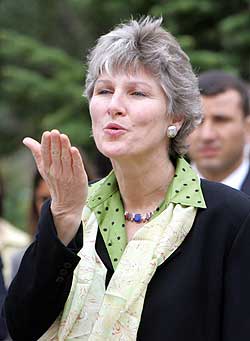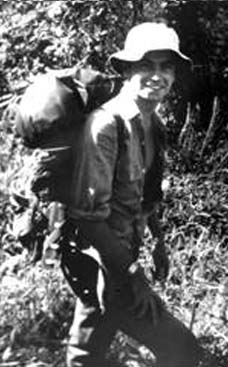
The problem was that Hughes and the others were trying to sell a product -- in this case, a foreign policy, instead of promoting American values. They each tried a variation of, "If we just explained our policies in a manner they could hear, then they would understand." People in other countries have understood all too well what this administration's policies are. They simply don't agree with them. Public diplomacy is more about influencing foreign publics and broadening dialogue between American citizens and institutions and their counterparts abroad than it is about "selling" a particular policy. The president has a final chance to change course on the public diplomacy front. First, Bush must replace Hughes with someone who has been a critic of the administration's past policies. This person should be in the vein of Secretary of Defense Robert M. Gates, a respected, nonpolitical public servant whose credibility is further strengthened by his nuanced disagreements with past policies. Such a person would signal a change in the way the administration appeals to the rest of the world. Second, Congress must play its part. There should be a rigorous confirmation process. Only two senators were in attendance for Hughes' confirmation testimony. What we need is a dramatic shift in how Washington explains to the world why America can still be "the beacon on a hill." Without effective public diplomacy, our nation is weakened because we are not able to push our policies with foreign governments when the U.S. is deemed the problem.
Price B. Floyd writes: Public diplomacy isn't PR
Public diplomacy isn't PR
template_bas
template_bas
U.S. foreign policy, not Karen Hughes, is the reason we're losing the world.
By Price B. Floyd
November 19, 2007
The United States has had arguably three of the nation's ablest communications gurus heading up the State Department's public diplomacy efforts over the last six years -- Charlotte Beers, Margaret Tutwiler and, most recently, Karen Hughes. Yet all three failed because they were trying to fix a public diplomacy problem with public relations solutions.
Hughes came in as the game changer in 2005. President Bush had put his most trusted communications expert in charge of improving the United States' image overseas. What set her apart from her predecessors was her relationship with the president: She could call him up and make things happen, and was seen as directly representing the president.
Early in her term, while visiting the Gaza Strip, Hughes was able to react instantly to a request by a delegation of Palestinians for a meeting with the president and receive immediate presidential approval. Finally, we had the right person for the right job, or so we thought. Last month she announced her resignation, with American standing at an all-time low in the Muslim world and elsewhere.
The problem was that Hughes and the others were trying to sell a product -- in this case, a foreign policy, instead of promoting American values. They each tried a variation of, "If we just explained our policies in a manner they could hear, then they would understand." People in other countries have understood all too well what this administration's policies are. They simply don't agree with them.
Public diplomacy is more about influencing foreign publics and broadening dialogue between American citizens and institutions and their counterparts abroad than it is about "selling" a particular policy.
The president has a final chance to change course on the public diplomacy front. First, Bush must replace Hughes with someone who has been a critic of the administration's past policies. This person should be in the vein of Secretary of Defense Robert M. Gates, a respected, nonpolitical public servant whose credibility is further strengthened by his nuanced disagreements with past policies. Such a person would signal a change in the way the administration appeals to the rest of the world.
Second, Congress must play its part. There should be a rigorous confirmation process. Only two senators were in attendance for Hughes' confirmation testimony.
What we need is a dramatic shift in how Washington explains to the world why America can still be "the beacon on a hill." Without effective public diplomacy, our nation is weakened because we are not able to push our policies with foreign governments when the U.S. is deemed the problem.
Instead of being seen as a protector of human rights, we are looked on as a serial abuser (Abu Ghraib, Guantanamo). We are not seen as a leader but as an impediment on the great issues of the day, such as a needed global effort to combat climate change. We are seen as a self-interested country that has repeatedly ignored international opinion, with a "go it alone" policy in Iraq and now possibly in Iran.
So how do we again become the country that is envied, not feared? And, how do we do this while projecting our power in a way that better protects us from our enemies?
We must first realize that the main obstacle to improving the perception of the U.S. overseas is our policies -- not the packaging of them.
We need to close the U.S. prison at Guantanamo Bay, join others in combating climate change and engage in an open and frank dialogue with all interested nations on developing a sustainable and pragmatic Iraq strategy. These will help, but they are only a start.
If we can tackle policy problems, we can then move to transform the way we promote our values and push our foreign policy objectives. It is time to admit the failure of disbanding and folding the U.S. Information Agency into the State Department. This agency's successful efforts to promote the U.S. as a counter to communism and the former Soviet Union went a long way toward winning the Cold War. What was formerly an agency that promoted American values and ideals is now just another public relations tool to sell this administration's policies.
This does not mean that our diplomats should be limited to traditional diplomacy; quite the contrary. One small way to make them more effective is to use them not just as bureaucrats, but allow them to take part in discussions in the mediums now used by those commenting on issues of the day, such as message boards and blogs.
The State Department has taken a step in the right direction with its blog the "DipNote," but this is still too controlled and artificial. We need to push our diplomats to take part in unofficial blogs and web chats -- much in the same way they talked to foreign intellectuals at embassy receptions in the past. These types of exchanges now take place on a much larger scale on the Web and involve the public.
Lastly, and probably most important, the president must lead the charge. I remember Ronald Reagan calling on Mikhail Gorbachev to tear down the Berlin Wall; I remember my parents talking about JFK and his vision. We need our leader to call for us to be a better nation, one that will be seen by those overseas as genuine and effective.
Price B. Floyd served at the U.S. Department of State for 17 years, last as director of media affairs, and is now with the Center for a New American Security.













